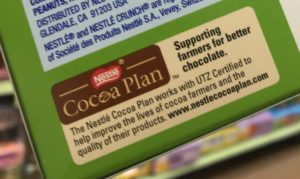Consumers Vote – 3 Things You Can Do
“Cocoa has been an important ingredient in global cultures and history, evolving over the years, and continues to be enjoyed today in thousands of different forms”1. Especially during holidays like Valentine’s Day, Easter, and Sweetest Day it is hard to resist retailer’s alluring displays of holiday-branded chocolates. But before you reach for that dazzling foiled wrapped chocolate, I encourage you to consider using your consumer dollars to vote (via your purchase) for companies that are moving forward with more ethical practices. Here are 3 things you can do to make a difference:
1. Learn Why You Should Care
We should be concerned because the processes behind the farming and trading of the most important commodities, such as cocoa, can be very ugly. Major concerns include the use of child labor, exposure of workers to dangerous pesticides, and other abuses including human trafficking. The Ivory Coast in Africa produces nearly half of the world’s cocoa, and it is a well-known fact that Africa’s cocoa industry has a history of human rights problems. “Achieving success in the fight against child labor in the cocoa sector is a shared responsibility that requires the time and talent of all interested parties, including cocoa-growing communities, governments in cocoa producing nations, the chocolate and cocoa industry, and chocolate-consuming nations around the world”1 (that includes me and you!). Download MAP’s Ethical Shopping Guide or check out worldcocoafoundation.org and/or follow the bean to the bar process to learn more.
2. Look for Fairtrade and Ethical Sourcing
Fairtrade works to help make farming more sustainable in countries such as Ivory Coast and Ghana. Look for the Fairtrade symbol on products before you buy. Unfortunately Fairtrade certification may be cost prohibitive for small farmers, so some organizations choose to work directly with farm co-ops to ensure there are no abuses hidden within their supply chains. These companies usually are transparent about their practices and include their commitment on their labels. I recently stopped at the grocery store and scanned the isles of chocolate Easter candy. It was disheartening that as I picked up chocolate bunny after bunny I was finding no mention about company practices. Alas though, I did find ONE bunny that was ethically sourced! Check out this label on the only chocolate bunny who can have a clear conscious in this giant row of candy…
3. Develop New Buying Habits
Fairtrade products are sometimes more costly and hard to find, but each year, more and more Fairtrade certified and ethically sourced products appear on shelves across the country. Consumers are becoming more interested in learning where our favorite foods come from and how they are grown. Start with one product and begin to read labels and research company policies AND practices (do they say what they do AND then do what they say?). Try to find an ethically sourced product, then commit that brand to your shopping list. Here are some tips and stores that I have found along my search.
- Trader Joe’s, sells some Fairtrade coffee and teas, also a 1.25 ounce Dark Chocolate Espresso Baton for 99¢
- Aldi’s carries Fairtrade products that are competitively priced. Check out their Fairtrade coffee and UTZ certified chocolate products.
- IKEA provides extensive information on their company policies and practices to protect people and the planet I love their towels and UTZ certified coffee and chocolate!
- Divine Chocolate – Holiday Specific Treats (Divine is often available in major grocery stores)
- Check out Starbucks, they have a goal to have 100% ethically sourced cocoa by 2020 for all Starbucks cocoa based beverages!
- You can often find ethically sourced products at Costco; they offer many organic and Fairtrade products
- I found a nice Fairtrade t-shirt at REI; they also carry Patagonia brand clothing for men and women.
- Read our blog “Becoming a Part of the Solution: First Steps to Ethical Shopping” to learn more!
Consumers VOTE with their buying dollars. We can see that some companies are starting to listen; and even better, some companies are starting to ACT. Dollar by dollar, WE ARE making a difference!
— Kathy Maitland – Director Michigan Abolitionist Project
For more information check out betterworldshopper.org or
1 worldcocoafoundation.org





